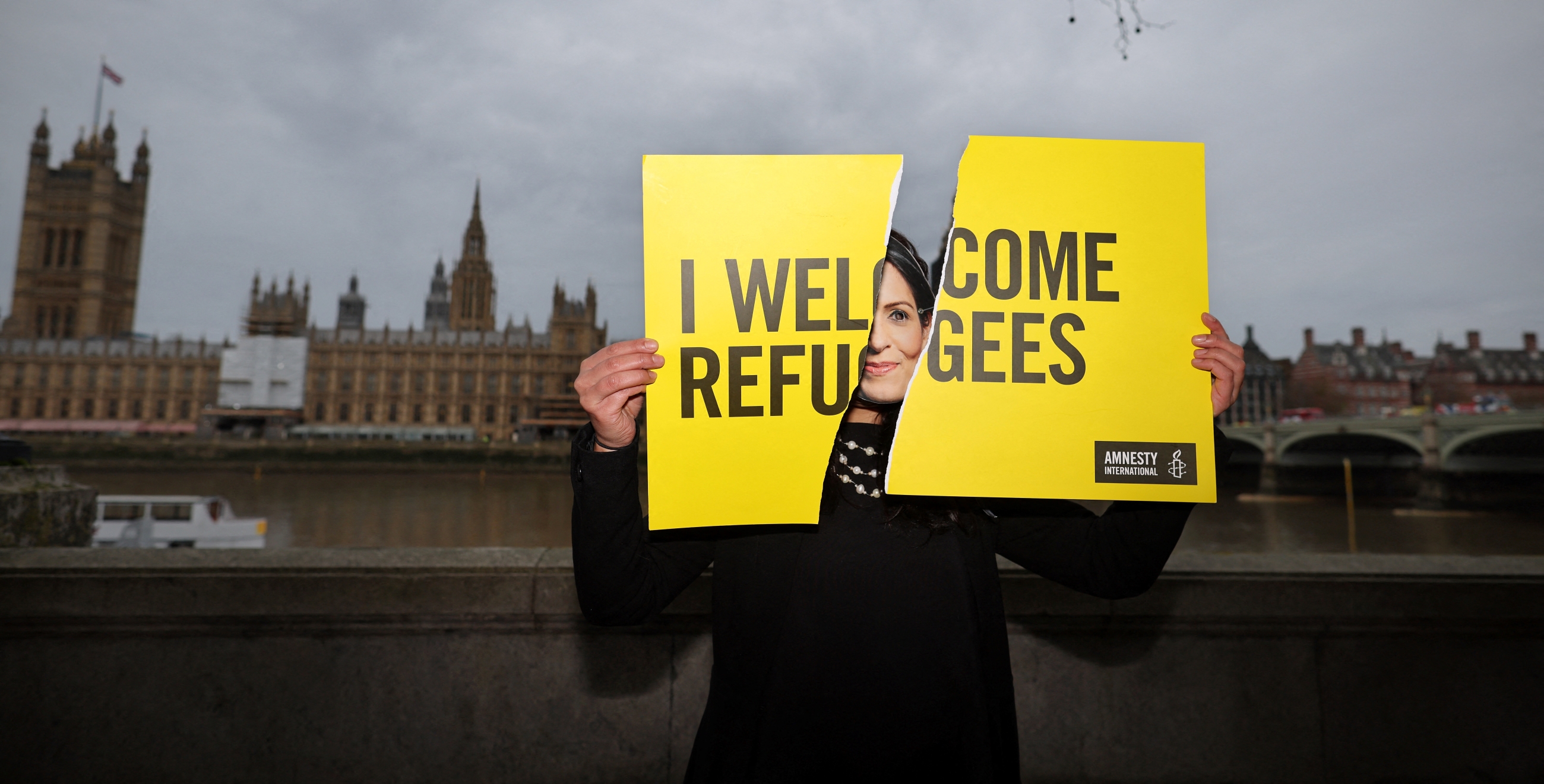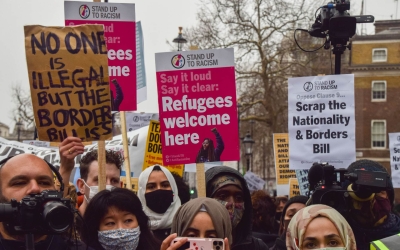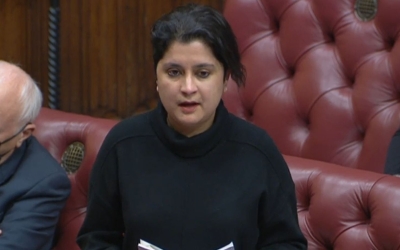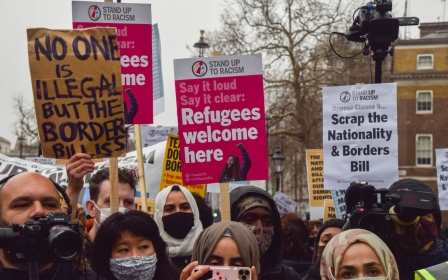UK: Controversial Nationality and Borders Bill explained

The British government is currently trying to pass its controversial Nationality and Borders Bill, which has come under intense criticism from human rights groups, the legal profession and parliament's own Joint Committee on Human Rights (JCHR).
The United Nations has also criticised the bill, with UN experts saying the British government's use of citizenship-stripping powers is likely discriminatory and unlawful because of its disproportionate impact on Muslim and migrant communities.
Parts of the bill include blocking or criminalising anyone who does not arrive in the United Kingdom as part of one of the Home Office's pre-arranged resettlement routes, plans to process refugees offshore and revoking British citizenship without notice.
The bill follows a rising number of migrant boat crossings to the UK, with more than 25,000 arriving via the Channel last year.
At the same time, with other routes into the country blocked, the number of people to have claimed asylum in the UK in the year ending June 2021 was 31,115, a four percent fall on the previous 12 months.
Dozens of pages of amendments have been tabled over the bill, which is currently going through the House of Lords and is expected to be made legally binding later this year.
Here's what you need to know about the Nationality and Borders Bill.
Immigration plans
In a policy paper published by the Home Office in July last year, the bill is described as "the cornerstone of the government's New Plan for Immigration, delivering the most comprehensive reform in decades to fix the broken asylum system".
The plan cites three main objectives:
- To make the system fairer and more effective so that we can better protect and support those in genuine need of asylum.
- To deter illegal entry into the UK, breaking the business model of criminal trafficking networks and saving lives.
- To remove from the UK those with no right to be here.
The amended plans will give the UK Border Force further powers to search "unaccompanied containers" and "stop and divert vessels suspected of carrying illegal migrants to the UK," which is subject to an agreement with France.
For those knowingly arriving in the UK without permission, the new rules would introduce tougher criminal offences, including raising the possible penalty from six months to four years imprisonment.
Life sentences will also be introduced for people smugglers, up from the current maximum of 14 years.
Offshore processing hubs
Under the plans set out by Home Secretary Priti Patel, migrants and refugees who arrive into the country through irregular migration routes - by boat, for example - will be placed in large accommodation centres or offshore processing hubs.
From there the Home Office will decide whether or not those detained can be returned to the European Union countries through which they passed on their way to the UK.
Those acknowledged as refugees will be granted temporary status and will have to go through additional assessments every two and half years so that the Home Office can assess whether they can be deported.
According to a report by Together With Refugees, the proposed plans will cost British taxpayers £2.7bn annually, including £717.6m used for accommodation centres and £1.44bn for the setting up and running of the immigration hubs.
Sabir Zazai, a spokesperson for Together With Refugees, who is also chief executive of the Scottish Refugee Council and a refugee himself, said in the report:
“This is an astonishing amount of additional public money for the unworkable and cruel proposals in the Bill - enough to pay for more than 80,000 NHS nurses a year.
“Having fled their homes in fear and struggled to find safety, these measures would leave women, children and men facing further hardship in prison, isolated in another country indefinitely, separated from family and facing insecurity and indecision.”
Responding to the report earlier this week, a Home Office spokesperson told The Guardian:
"These figures are pure speculation. While lives are being lost in the Channel, we will look at all options available to us.
Our broken asylum system is costing the taxpayer an unacceptable £4.7m a day on hotels, which is why urgent reform is needed.
"Our New Plan for Immigration will fix the broken asylum system so that we spend less time and money on those abusing the system, enabling us to focus on helping those in genuine need."
Asylum seekers have been housed in hotels that also act as brothels, openDemocracy reported in 2020.
Despite the British government being willing to provide potentially hundreds of millions of pounds to countries that are willing to host the centres, they have struggled to find any potential takers.
Both Ghana and Rwanda had been reported as potential processing centres, but Ghana has since denied that it is in talks with the British government.
In a statement to inews, the Ghanaian High Commission said: "The Government of Ghana have not held any discussions with the UK government concerning the establishment of a processing centre for migrants attempting to reach Britain."
Last year, Albania was seen as a potential host but pulled out once it was reported to be in negotiations.
Widespread criticism
Last month, 100 civil society figures signed an open letter to the House of Lords, warning that passing the bill "will violate the UK’s commitment under international law to provide safe passage and refuge and also cement a racist and Islamophobic two tier citizenship regime in the UK".
Human rights organisations have also condemned the bill, arguing that if passed the legislation would undermine the UN's refugee convention and the UK's obligations under the Convention on the Rights of the Child and the Convention on Reduction of Statelessness.
Last month, the campaign group Freedom From Torture called the bill "the biggest attack on the rights of refugees, and torture survivors in 70 years".
The same group said plans to send those claiming asylum to offshore centres would breach three articles of the European Convention on Human Rights.
In October, a team of leading immigration lawyers also concluded that the controversial bill breaches international and domestic law in at least 10 different ways and accused the government of "riding roughshod" over its obligations.
Stripping of citizenship
Beyond the treatment of asylum seekers, another of the most controversial aspects of the Nationality and Borders Bill is that the Home Office would no longer have to notify people if they have had their citizenship revoked.
In the same open letter to the House of Lords over the bill, civil society figures said such a move would leave "millions in constant uncertainty as to the status of their citizenship".
"This bill is a route to disenfranchisement and even deportation of people of colour on an unprecedented scale," it added.
Under the current system, British nationals whose citizenship is revoked must be notified and have a right to challenge the decision through an appeals process.
The proposed legislation, contained in Clause 9 of the Nationality and Borders Bill, would instead give the government the right to deprive somebody of citizenship without notifying them if it is not practically possible to do so, because of national security or diplomatic considerations, or “for any other reason”.
Under international law it is illegal to make a citizen stateless. However, the UK government argues it can strip people of their nationality if they are entitled to citizenship of another country.
Middle East Eye exclusively reported in 2017 that British aid workers based in opposition-held areas of Syria were being stripped of their citizenship amid concerns that returnees from the country posed a security threat to the UK.
The powers were used most extensively against British nationals suspected of links to the Islamic State (IS) group, as territory held by the militants in Syria and Iraq imploded.
Out of 172 people deprived of citizenship between 2010 and 2018, 104 of those cases occurred in 2017, according to Home Office figures.
The Home Office has described citizenship as "a privilege, not a right". It says the use of citizenship-stripping powers is reserved for “those who pose a threat to the UK or whose conduct involves very high harm”.
Middle East Eye propose une couverture et une analyse indépendantes et incomparables du Moyen-Orient, de l’Afrique du Nord et d’autres régions du monde. Pour en savoir plus sur la reprise de ce contenu et les frais qui s’appliquent, veuillez remplir ce formulaire [en anglais]. Pour en savoir plus sur MEE, cliquez ici [en anglais].






